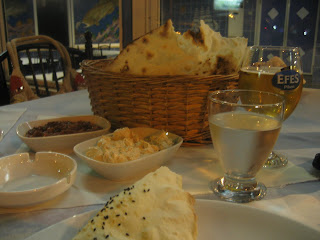Unless one lives in Anamur, Turkey.
Here, bananas--among a plethora of tropical fruits--reign, and it was thanks to this fruit that a brief visit to the coastal town turned out to be so memorable.
Leaving the happy wedding party behind, R. and I boarded a bus from Mersin to Anamur, and after a five-hour, vertiginous journey of hugging sheer cliffs (English hedgerows have nothing on these blind turns), which turned into an eight-hour journey thanks to a flat tire--and which involved me almost being left in the gas station toilet--we arrived at dusk.
Tired and a bit nauseous, we headed for a large fruit stand across the street from the bus station where pile upon pile of bananas were stacked. 'Banana Man' offered us a place to sit at the adjacent cafe and suggested we stay at his friend's hotel in the Iskele [port] district, near the beach. His friend would even come pick us up. Letting down our urban guard of distrust and general code of cynicism, we felt comfortable enough chalking the offer up to genuine, small town hospitality, and agreed.
Within minutes, Hamdi Bey turned up in his car, led us to our basic but charming room, and sent his teenage colleague to accompany us to the best fish restaurant in town, Kap Hotel Restaurant.
We chose a sea bass out of the cooler and ordered calamari and two mezes spreads to top the famous 'pillow bread'. Our fish was promptly grilled to perfection and served with lemon and rocket, along with tomato and cucumber salad. Washed down with a cold Efes and finished with a massive plate of some of the most tasty fruit I've ever consumed, we left contented, to say the least.

(before) (after)


There was nothing extraordinary about this delicious meal; it's not dissimilar to the fish restaurant offerings one would find dotted all along the Mediterranean. The beauty was in the simplicity. The fish had clearly been caught that day, the bread was straight out of the wood oven, and the fruit...well, the fruit tasted as it should--cherries with deep, liquored juice, peaches whose juice ran down chins, and melons that actually tasted of something. I don't like watermelon, but I ate watermelon [karpuz] in Anamur.
Best of all, however, were the bananas. Anamur's is the only climate in Turkey capable of sustaining large-scale banana production, and there are greenhouses as far as the eye can see, nestled below the Toros Mountains. They are smaller than imported varieties, and it is as though the flavour is concentrated in its smaller size. With a firm texture and rich, velvety flesh, what to bring for lunch at the beach was a no-brainer: we feasted on pepinos (tastes like a cross between a cucumber and a melon), sweet and sour cherries, and bananas.
Best of all, however, were the bananas. Anamur's is the only climate in Turkey capable of sustaining large-scale banana production, and there are greenhouses as far as the eye can see, nestled below the Toros Mountains. They are smaller than imported varieties, and it is as though the flavour is concentrated in its smaller size. With a firm texture and rich, velvety flesh, what to bring for lunch at the beach was a no-brainer: we feasted on pepinos (tastes like a cross between a cucumber and a melon), sweet and sour cherries, and bananas.


The Anamur Muz [banana] Festival takes place in August, and transport to the area is improving with the opening of the Gazipasa airport, near Alanya.
Kap Hotel Restaurant (İskele Meydani'ndaki; +90 (0)324 814 2374)
Eda Motel (İskele Mahallesi, 24-Turgut Reis Caddesi (Eski iskele yolu) No:14; +90 (0)324 814 6319)








